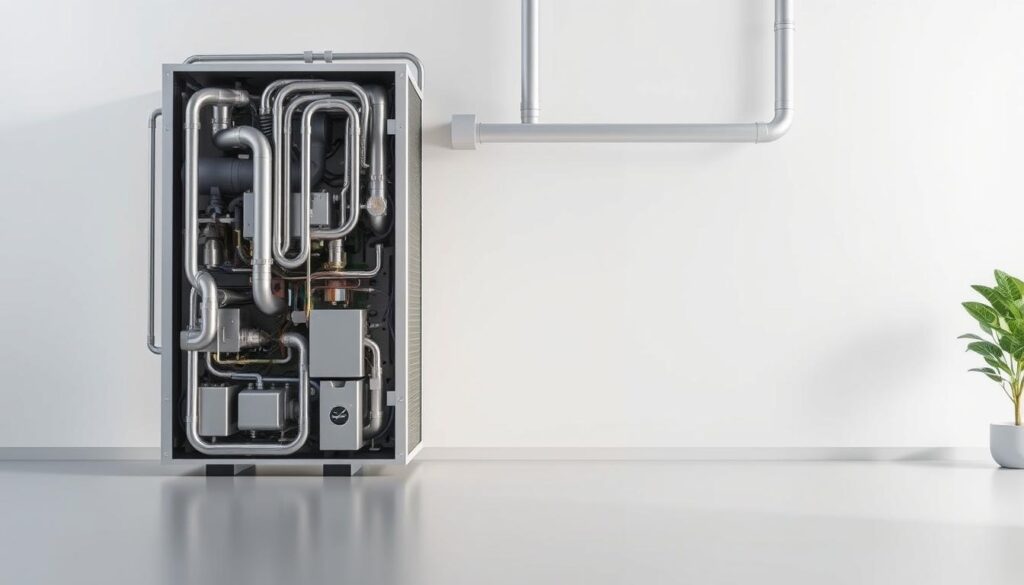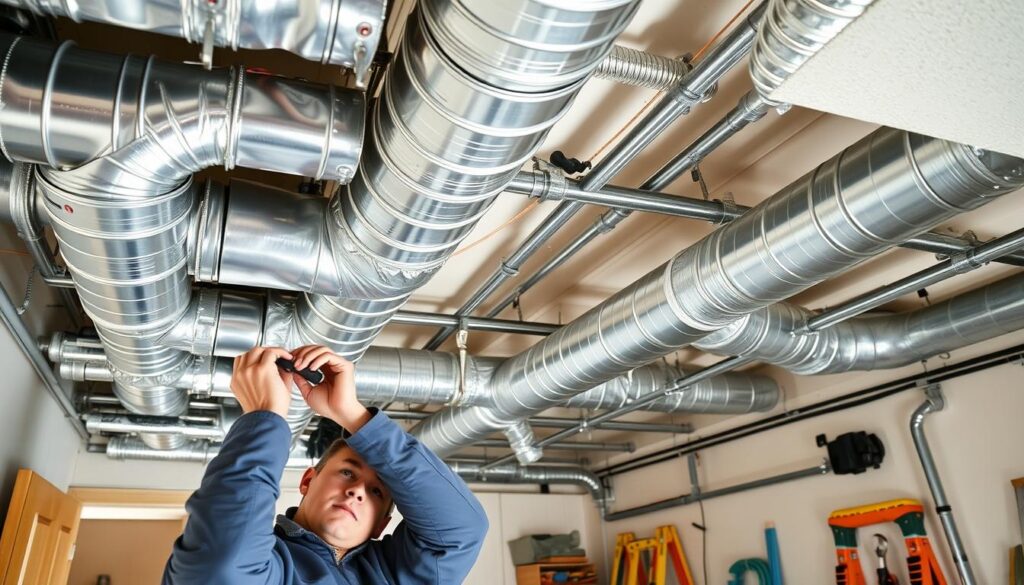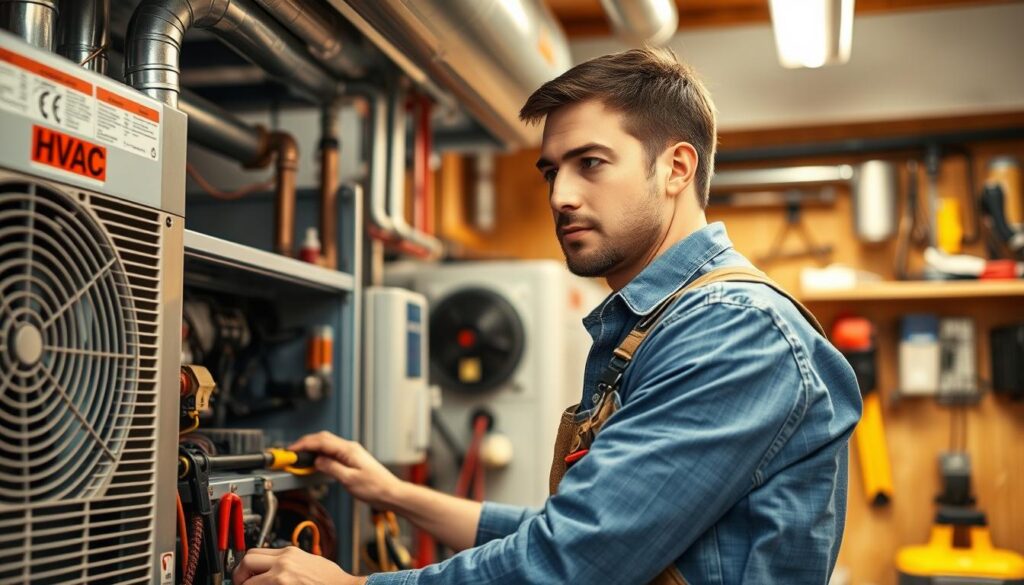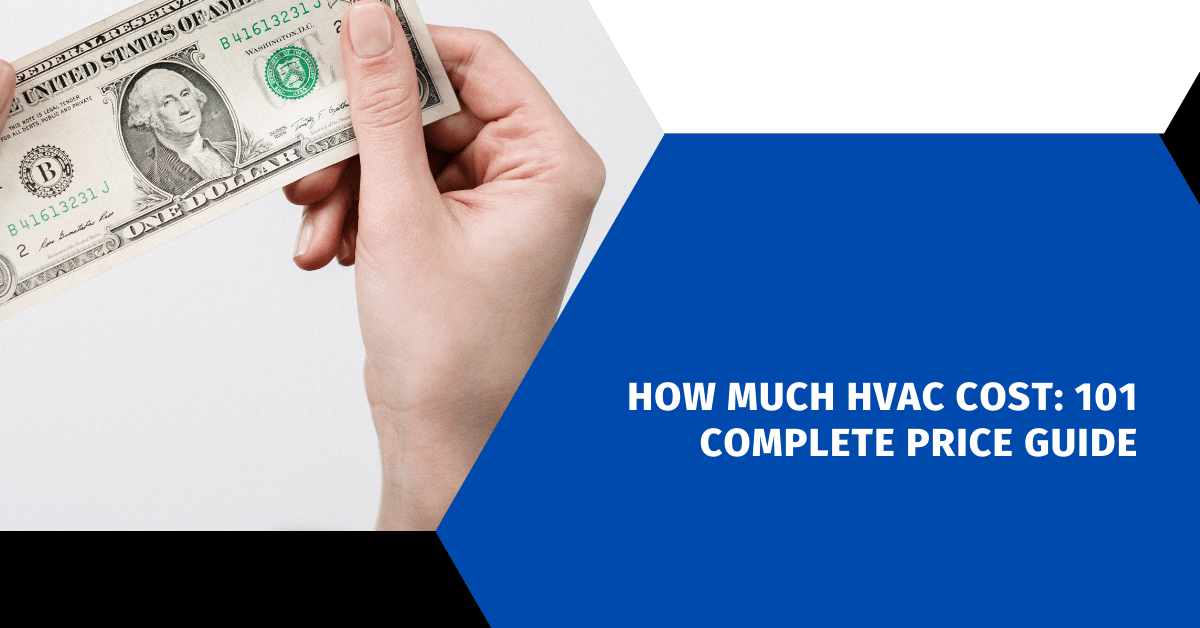Affiliate Disclosure
HVAC Guide Guys is a participant in the Amazon Services LLC Associates Program, an affiliate advertising program designed to provide a means for sites to earn advertising fees by advertising and linking to Amazon.
How Much HVAC Cost? Ever wondered why your neighbor’s HVAC upgrade was so different from yours? Knowing the real costs of heating and cooling can save you a lot of money.

Homeowners often find out how much HVAC systems cost can vary. The average price for a new system is between $5,000 and $12,500. Most installations usually cost around $7,500.
This guide will cover everything you need to know about HVAC costs. We’ll talk about system types, installation costs, and energy efficiency. This will help you make smart choices for your home’s comfort without breaking the bank.
Key Takeaways
- HVAC system prices vary widely based on multiple factors
- National average installation costs range from $5,000 to $12,500
- Home size and system efficiency significantly impact overall expenses
- Professional assessment is key for accurate cost estimation
- Energy-efficient systems offer long-term financial benefits
Table of Contents
Understanding HVAC Systems and Their Components
Your home’s comfort comes from a complex system of heating, cooling, and ventilation. Knowing about hvac unit prices means understanding the main parts that keep your home at the right temperature and air quality.
HVAC systems are complex to keep your home comfortable. Homeowners should know that the cost of installation changes based on the components and their features.
Central Air Conditioning Units
Central air conditioning systems are key for cooling your home. They have two main parts:
- Outdoor condensing unit
- Indoor evaporator coil
Today’s central AC units vary in efficiency, affecting your home’s comfort and energy bills. Choosing the right unit is important for your specific cooling needs.
Furnace Systems
Furnaces are vital for warming your home in winter. They come in different types:
- Gas furnaces
- Electric furnaces
- Oil furnaces
Each type affects hvac unit prices and system performance. The efficiency rating of a furnace also impacts your energy costs over time.
Heat Pumps and Ventilation
Heat pumps are great for both heating and cooling your home. They move heat between inside and outside, making them an energy-saving choice compared to traditional HVAC systems.
Good ventilation is key for air quality and system efficiency. Your HVAC system’s ductwork is important for spreading heated or cooled air around your home.
Explore Our HVAC Shop
Looking for top-rated HVAC tools, parts, and accessories? Visit our shop and find the perfect solution for your needs.
Visit the ShopAverage HVAC Installation Costs by System Type
Understanding hvac installation costs is key to planning your home’s comfort budget. Different HVAC systems have varying prices. These prices depend on several factors.
Exploring hvac system prices shows big differences among unit types. Here are the average installation costs for main HVAC systems:
- Central Air Conditioning Units: Typically range from $1,900 to $5,500
- Furnace Systems: Cost between $1,600 and $10,000
- Heat Pumps: Average installation prices from $4,000 to $7,500
Your specific hvac installation costs depend on several key elements:
- Home square footage
- System efficiency ratings
- Local climate conditions
- Brand quality and complexity of installation
Choosing the right HVAC system is about balancing initial costs and long-term energy savings. A professional can help you find the best option for your home’s needs.
Explore Our HVAC Shop
Looking for top-rated HVAC tools, parts, and accessories? Visit our shop and find the perfect solution for your needs.
Visit the ShopHow Much HVAC Cost: Breaking Down Price Factors
When you’re thinking about getting an HVAC system, knowing what affects the price is key. Your home’s size and the type of system you choose are big factors in the cost.
Many things can change how much your heating and cooling system will cost. Let’s look at the main factors that affect your HVAC’s energy use and overall cost.
Home Size and Layout Impact
Your home’s size and layout really matter when it comes to HVAC needs. Bigger homes need stronger systems, which means higher costs. Important things to think about include:
- Square footage of living space
- Ceiling heights
- Number of floors
- Insulation quality
- Window placement and size
Energy Efficiency Ratings
How efficient your HVAC system is affects both the initial cost and long-term savings. Systems with higher efficiency ratings might cost more upfront but can save you money on bills.
- SEER ratings for air conditioners
- AFUE ratings for furnaces
- Energy Star certified systems
Brand Selection and Quality
Not all HVAC systems are the same. High-end brands might be pricier but usually offer better performance, last longer, and come with longer warranties. When choosing, consider:
- Manufacturer reputation
- Technology features
- Warranty length
- Performance track record
Pro tip: Invest in quality components that balance initial cost with long-term efficiency and reliability.
Ductwork Expenses and Considerations
Understanding ductwork is key to knowing your hvac installation costs. Ductwork is like your home’s air highway, spreading heat and cool air everywhere. The cost usually starts at $15 per foot, but many things can change this price.

Your home’s layout and current setup are big factors in ductwork costs. Important things to think about include:
- Home square footage
- Complexity of duct routing
- Material selection
- Accessibility of installation areas
Ductwork materials can also affect your costs:
| Material Type | Cost per Linear Foot | Durability |
|---|---|---|
| Flexible Ductwork | $1 – $4 | Low |
| Sheet Metal | $5 – $10 | High |
| Fiberglass Duct Board | $7 – $15 | Medium |
Getting a pro to check your ductwork is a must before installing your HVAC. Older homes might need new duct systems, which can raise costs a lot.
“Proper ductwork design can improve your HVAC system’s efficiency by up to 20%.” – HVAC Engineering Association
Choosing good ductwork now can save you money and energy later. It also makes your heating and cooling work better.
Explore Our HVAC Shop
Looking for top-rated HVAC tools, parts, and accessories? Visit our shop and find the perfect solution for your needs.
Visit the ShopAdditional HVAC Components and Accessories Pricing
Adding extra parts to your HVAC system can make your home more comfortable and healthy. These upgrades might raise the cost of your HVAC system. But they offer big benefits for your living space. Knowing what you might spend can help you choose wisely.
Today’s HVAC systems come with many accessories beyond just heating and cooling. These extras can change your home’s feel and might cut down on energy bills over time.
Smart Thermostats and Controls
Smart thermostats are a big step forward in controlling your home’s climate. They let you:
- Change the temperature from your phone
- See how much energy you use
- Learn your preferences and adjust
- Cost: $120 to $260
Air Purifiers and Filters
Clean air is key to a healthy home. High-tech air cleaners can:
- Trap allergens and particles
- Clean the air for your whole house
- Prices depend on your home’s size and needs
UV Lamps and Dehumidifiers
There are special HVAC tools for certain problems:
- UV lamps kill germs in your system
- Dehumidifiers keep moisture levels right
- UV lamp cost: Up to $1,500
- Dehumidifier price: $1,300 to $2,800
These extras might cost more upfront. But they can make your home more comfortable, healthy, and energy-efficient over time. Think about what you need and talk to HVAC experts to find the best fit for your home.
Labor Costs and Installation Expenses

When you think about hvac installation costs, remember it’s not just about the equipment. Labor costs are a big part of the total cost. HVAC contractors usually charge between $75 to $250 per hour. This price can change based on where you live and how complex the project is.
Several things affect how much you’ll pay for hvac contractor rates:
- Contractor experience and certification levels
- Project complexity and system type
- Local market rates and competition
- Residential vs. commercial installation requirements
The cost for labor to install a complete HVAC system can be between $1,500 to $5,000. More complex installations in bigger homes or with special equipment can cost more. Things like ductwork changes, electrical upgrades, and unique building designs can also raise the cost.
When looking at hvac installation costs, keep these tips in mind:
- Get quotes from licensed contractors
- Check if the contractor is certified and insured
- Ask for detailed written estimates
- Compare labor rates to what others charge
Finding the right HVAC contractor is more than just looking for the cheapest price. Look for quality, expertise, and reliable service. This ensures a good installation that will last and keep you comfortable for years.
Explore Our HVAC Shop
Looking for top-rated HVAC tools, parts, and accessories? Visit our shop and find the perfect solution for your needs.
Visit the ShopHVAC Financing Options and Payment Plans
Buying a new HVAC system is a big deal for homeowners. Knowing about hvac financing options makes it easier to afford. Looking into different payment plans can help you manage the cost better.
When you look into HVAC financing, you’ll find several main options. These can make upgrading your home’s comfort more doable:
- Home equity loans
- Personal loans
- Manufacturer financing programs
- Credit card financing
Home Equity Loans
Home equity loans are a low-interest way to finance your HVAC system. They use your home’s equity as collateral. This can lead to big savings on hvac system prices.
Personal Loans
Personal loans are flexible for homeowners without equity. Banks, credit unions, and online lenders offer these loans. Interest rates depend on your credit score, but they’re a fast fix for HVAC costs.
Manufacturer Financing
Many HVAC makers work with banks to offer direct financing. These deals often come with:
- Competitive interest rates
- Flexible repayment terms
- Potential zero-interest periods
Before picking a financing option, check the terms and interest rates. Also, think about your financial situation. Comparing different hvac financing options can help you find the best deal for your home comfort.
Energy Efficiency and Long-term Cost Savings
Learning about hvac energy efficiency can cut down your heating and cooling costs over time. High-efficiency HVAC systems might cost more at first. But, they save you money in the long run.
When looking at HVAC costs, remember these important points:
- Seasonal Energy Efficiency Ratio (SEER) ratings
- Annual Fuel Utilization Efficiency (AFUE) percentages
- Energy Star certification
Choosing a high-efficiency system can cut your energy use by 20-40%. New units with SEER ratings over 16 use much less electricity than old ones.
| SEER Rating | Energy Savings | Estimated Annual Cost |
|---|---|---|
| 13-14 | Standard Efficiency | $750-$900 |
| 16-18 | High Efficiency | $600-$750 |
| 20+ | Premium Efficiency | $450-$600 |
Government incentives and utility rebates can help with the cost of hvac energy efficiency. Many states give tax credits for switching to energy-efficient systems. This makes high-performance units more affordable.
Smart homeowners see HVAC investments as long-term financial plans, not just immediate costs.
By focusing on energy efficiency, you can save thousands of dollars over your system’s life. You’ll also reduce your environmental impact.
Explore Our HVAC Shop
Looking for top-rated HVAC tools, parts, and accessories? Visit our shop and find the perfect solution for your needs.
Visit the ShopMaintenance Costs and Service Agreements
Keeping your HVAC system in top shape is key. Regular checks can stop sudden breakdowns and make your system last longer. Knowing how much maintenance costs helps you plan your budget and avoid big repair bills.
Typical costs for routine HVAC checks are between $70 and $200 per visit. These visits include detailed system checks to spot issues early, saving you money later.
- Basic maintenance visit: $70-$125
- Comprehensive system inspection: $125-$200
- Annual service agreement: Up to 20% off costs
Service agreements are a big plus for homeowners. They offer early scheduling, lower repair prices, and regular tune-ups. This investment can cut down on long-term maintenance costs and boost your system’s performance.
Most service agreements include important maintenance tasks:
- Cleaning air filters
- Checking refrigerant levels
- Inspecting electrical connections
- Lubricating moving parts
- Testing system performance
Pro tip: Always compare different service agreement options and read the fine print. This way, you know what’s included in your maintenance package.
Conclusion
Figuring out the cost of HVAC can be tricky, but knowing the basics helps. HVAC prices range from $5,000 to $16,000. This depends on your home’s needs and the equipment you choose.
Don’t just look at the initial cost. Think about energy savings and how long the system will last. Getting it installed right and keeping it maintained can save you money and extend its life.
Your home’s size, insulation, and climate affect the best HVAC choice. Weighing the upfront cost against long-term savings is key. This way, you get comfort without breaking the bank.
Choosing a high-efficiency HVAC is smart for your wallet and the planet. Do your research, get expert advice, and plan carefully. This will help you find the right system for your home.
FAQ
What is the average cost of a new HVAC system?
How do I know what size HVAC system I need for my home?
Are high-efficiency HVAC systems worth the extra cost?
How often should I replace my HVAC system?
What financing options are available for HVAC installations?
Do I need to replace my ductwork when installing a new HVAC system?
What additional components can improve my HVAC system’s performance?
What is the average cost of a new HVAC system?
How do I know what size HVAC system I need for my home?
Are high-efficiency HVAC systems worth the extra cost?
How often should I replace my HVAC system?
What financing options are available for HVAC installations?
Do I need to replace my ductwork when installing a new HVAC system?
What additional components can improve my HVAC system’s performance?
FAQ
What is the average cost of a new HVAC system?
The cost of a new HVAC system varies. It depends on your home’s size, system type, and efficiency rating. On average, expect to pay between ,000 and ,000 for a complete system. Central air units cost between ,500 to ,500, and furnace systems between ,500 to ,000.
How do I know what size HVAC system I need for my home?
The right size depends on your home’s size, insulation, ceiling height, and climate. A professional can do a load calculation to find the right size. You’ll need about 20 BTUs per square foot, but other factors like sun exposure and window quality can affect this.
Are high-efficiency HVAC systems worth the extra cost?
High-efficiency systems cost more upfront but save money over time. They can cut your energy bills by 20-40% compared to older systems. Plus, many utility companies offer rebates for energy-efficient systems, making them more affordable.
How often should I replace my HVAC system?
HVAC systems usually last 10-15 years with good care. You might need to replace it sooner if you’re facing frequent repairs, high energy bills, or uneven comfort. New systems are more energy-efficient, saving you money in the long run.
What financing options are available for HVAC installations?
There are many financing options for HVAC systems. You can get personal loans, home equity loans, or manufacturer financing. Many contractors also offer in-house financing with flexible plans. Options include zero-percent intro rates, extended terms, and home improvement credit lines.
Do I need to replace my ductwork when installing a new HVAC system?
It depends on your ductwork’s condition. If it’s over 15 years old, damaged, or poorly designed, you might need new ducts. A professional can check if your ducts are compatible with a new system or need changes.
What additional components can improve my HVAC system’s performance?
Several accessories can boost your system’s performance. Smart thermostats, air purifiers, UV germicidal lamps, and dehumidifiers can improve air quality and efficiency. Prices vary from 0 to
FAQ
What is the average cost of a new HVAC system?
The cost of a new HVAC system varies. It depends on your home’s size, system type, and efficiency rating. On average, expect to pay between $5,000 and $12,000 for a complete system. Central air units cost between $3,500 to $7,500, and furnace systems between $2,500 to $6,000.
How do I know what size HVAC system I need for my home?
The right size depends on your home’s size, insulation, ceiling height, and climate. A professional can do a load calculation to find the right size. You’ll need about 20 BTUs per square foot, but other factors like sun exposure and window quality can affect this.
Are high-efficiency HVAC systems worth the extra cost?
High-efficiency systems cost more upfront but save money over time. They can cut your energy bills by 20-40% compared to older systems. Plus, many utility companies offer rebates for energy-efficient systems, making them more affordable.
How often should I replace my HVAC system?
HVAC systems usually last 10-15 years with good care. You might need to replace it sooner if you’re facing frequent repairs, high energy bills, or uneven comfort. New systems are more energy-efficient, saving you money in the long run.
What financing options are available for HVAC installations?
There are many financing options for HVAC systems. You can get personal loans, home equity loans, or manufacturer financing. Many contractors also offer in-house financing with flexible plans. Options include zero-percent intro rates, extended terms, and home improvement credit lines.
Do I need to replace my ductwork when installing a new HVAC system?
It depends on your ductwork’s condition. If it’s over 15 years old, damaged, or poorly designed, you might need new ducts. A professional can check if your ducts are compatible with a new system or need changes.
What additional components can improve my HVAC system’s performance?
Several accessories can boost your system’s performance. Smart thermostats, air purifiers, UV germicidal lamps, and dehumidifiers can improve air quality and efficiency. Prices vary from $200 to $1,000, depending on the features.
How much does HVAC maintenance cost?
HVAC maintenance costs $150 to $300 a year for a service agreement. This includes inspections, cleaning, and adjustments. Annual plans can prevent expensive repairs and extend your system’s life. Some plans offer priority service and repair discounts.
,000, depending on the features.
How much does HVAC maintenance cost?
HVAC maintenance costs 0 to 0 a year for a service agreement. This includes inspections, cleaning, and adjustments. Annual plans can prevent expensive repairs and extend your system’s life. Some plans offer priority service and repair discounts.

